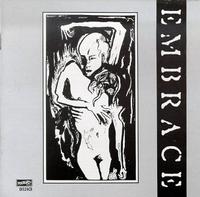Though legendary in certain crowds, Embrace never quite received the widespread recognition they deserved as a crucial act in the formation of emo. While many fans of the genre are willing to return its pioneers, such as Rites of Spring, DC’s emotive hardcore (or as Embrace frontman, Ian MacKaye, would call it, simply hardcore) scene was an absolute goldmine for some of the most simultaneously influential and underappreciated music of the 80s. Such is the case with Embrace, a short-lived post-hardcore act, featuring ex-members of Minor Threat, One Last Wish, and The Faith, with one game-changing, posthumous record. This self-titled masterstroke would go on to influence the likes of 90s reinvention-era catalyst, Sunny Day Real Estate, with its intimate take on lofty post-hardcore instrumentals, or proto-screamo act, Moss Icon, with its amalgamation of hardcore grit and post-punk dissonance.
But, cultural significance aside, how does Embrace hold up against later iterations of sound they helped spawn? Well, for one, the scant degrees of separation between Embrace and the genre’s hardcore roots preserved a coarseness, which many later emo bands would abandon. But this hardcore foundation didn’t stop the band from exploring dynamic arrangements. In fact, this inconsistency in aggression, antithetical to the relentless brutalism of its hardcore contemporaries, was imperative to effectively conveying the emotive angle of MacKaye’s lyrics.
This impetus towards writing lyrics with emotional weight was expressed on Embrace’s opener, “Give Me Back”. This song took listeners into the writing process, as MacKaye attempts to make himself “bleed onto paper,” but can only articulate emotions of content. “Give Me Back” also declared MacKaye’s intent to bridge the gap between the outside world and how we invest ourselves in it. This was a reoccurring theme in the lyrics of Minor Threat, but addressed more directly in the “your emotions are nothing but politics” refrain of “No More Pain”.
Embrace was undoubtedly political but circumvented assumptions of preachiness by focusing on the personal implications of said politics. “Money” is a prime example of this virtue. While its concept, a critique of consumerism and greed, wasn’t particularly cutting edge, the framing of its strain on personal relationships gave the band’s message a heightened potency.
Sonically, Embrace pushed the envelope by subverting hardcore’s “race to the brutest” trajectory, in favor of a more ethereal experience. Many tracks experimented with the groove-centric structures that MacKaye’s later projects would build upon. Less than a month after the disbandment of Embrace, MacKaye and Nelson would form Egg Hunt. This short-lived two-piece recorded two tracks, originally written for Embrace, which foreshadowed the bassy fabric of Fugazi’s core sound. But, ultimately, Embrace laid the foundation for these dynamic indulgences with cuts like “I Wish I,” “Money,” and “End of a Year”.
Productionally, Embrace wasn’t all too enthralling; the band opted to perpetuate a standard Dischord sound, incorporating the occasional distinctive nuance. But the album’s most ear-catching asset is easily its tasteful application of reverb to emulate a spacey and almost gothic atmosphere.
Over 30 years later these songs still stand on their own. Embrace’s emphasis on intimacy, a pivotal asset in translating the passion of 80s hardcore punk, preserves the impact of these 33 masterful minutes. It’s hard to overstate how indebted the modern music landscape is to Embrace’s self-titled release.
